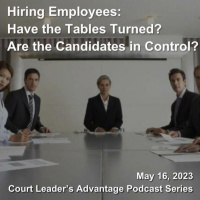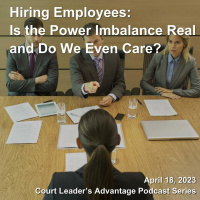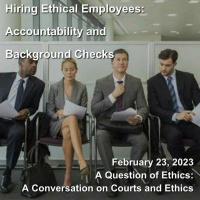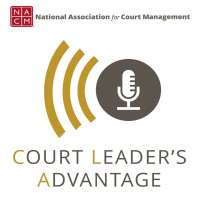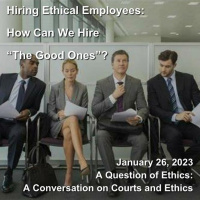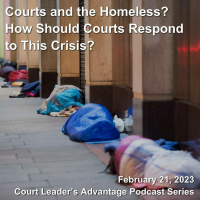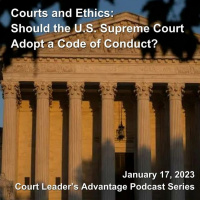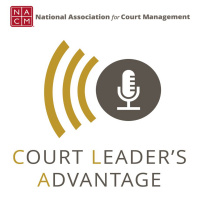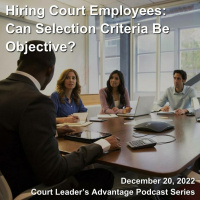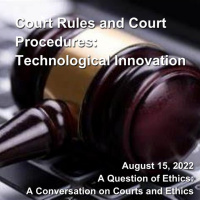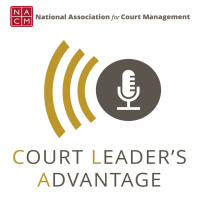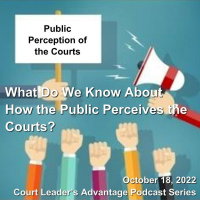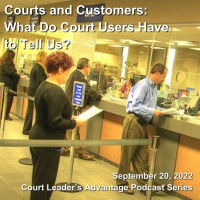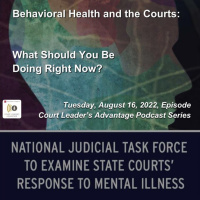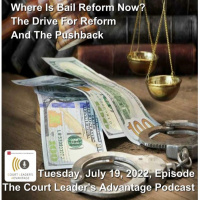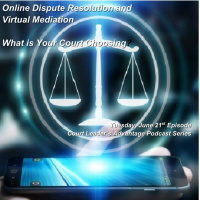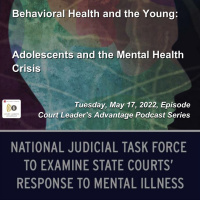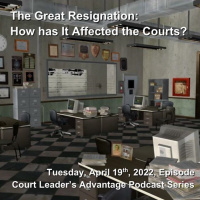Sinopsis
Coming innovations, thought-provoking trends, questions that matter to the court community, these and more themes are covered by the Court Leaders Advantage podcast series, a forum by court professionals for court professionals to share experiences and lessons learned.
Episodios
-
Hiring Employees: Have the Tables Turned? Are the Candidates in Control?
15/05/2023 Duración: 28minMay 16th, 2023, Court Leader’s Advantage Podcast Episode It was not that long ago that the phrase “you’re lucky to have a job” was powerful advice. Nowadays, employers across multiple business sectors are complaining of unfilled staff positions. Shortages of teachers and restaurant workers immediately come to mind. On the other hand, just lately we are once again hearing about massive layoffs. Google, Meta, Disney, and Amazon have all recently laid off workers. Has the balance of power between job applicants and employers shifted? Has it shifted in favor of the applicants? If it has, will it last? This month we are looking at courts and the hiring crisis. Do job candidates right now hold the upper hand in the hiring process, and how are courts coping? Today’s Panelists Dana Bartocci is the Human Resources and Development Director for the Minnesota State Judicial Branch. Dana has served in various capacities in law firm and law school professional development, career coaching, training and p
-
Hiring Employees: Is the Power Imbalance Real and Do We Even Care?
17/04/2023 Duración: 32minApril 18th, 2023, Court Leader’s Advantage Podcast Episode We have been talking about various aspects of employee recruitment and selection, often as it intersects with diversity, equity, and inclusion. This brought up the topic of the power imbalance surrounding employee selection. Traditionally, job candidates enter the selection process in a powerless and sometimes even in a belittling position. The NACM Model Code of Conduct, Canon 1.4 states “A court professional treats litigants, co-workers, and all others interacting with the court with dignity, respect, and courtesy.” So, the questions arise: · Is the power imbalance in the hiring process real? · Is it disrespectful to job candidates? · Do we who hire court employees actually have any interest in altering that power imbalance? Most of us have been on both sides of the interview table. And most of us can agree that applying for a job can be competitive and it can be nerve-wracking; can it also be demeaning? Today’s Panelists Karl Thoennes,
-
Hiring Ethical Employees: Accountability and Background Checks
10/04/2023 Duración: 35minFebruary 23, 2023, A Question of Ethics Conversation Episode This is the second of a two-part conversation on hiring ethical employees. Part-one, (held January 26th, 2023), is available on the Ethics Subcommittee Webpage, on the NACM website. What actions can courts take to optimize the hiring of ethical staff? What can you do to ensure that the people you hire will adhere to your court’s Code of Conduct? Relying on Bruce Weinstein’s book, The Good Ones: Ten Crucial Qualities of High Character Employees, the panel discusses the options courts have to identify ethical employees including interview questions about accountability and background checks. The panel considers questions including: · Describe a situation in which you took responsibility for a mistake you made. What were the consequences to you for doing so? · Have you ever taken responsibility for an error that another team member made? Tell me about it. · Tell me about a typical working day. Other options the panel discuses include calling refe
-
Diversity, Equity, and Inclusion: Is It a Zero-Sum Proposition?
20/03/2023 Duración: 31minNumerous organizations, including courts, are embracing Diversity, Equity, and Inclusion. With that increasing acceptance, we are also seeing increasing resistance, and it is important to address that resistance directly. On the December episode we discussed the question “can hiring criteria, particularly for managers and supervisors, be objective?” This month we are going to explore the growing question “Is Diversity, Equity, and Inclusion a Zero-Sum Proposition for White employees?” Michael Norton from Harvard University, and Samuel Summers from Tufts University, surveyed 417 citizens on their conception of racism in America.[1] Several of their conclusions are worth noting: · Overall anti-Black bias has been declining over the years. · White responses perceived that anti-Black bias has been declining at a rate even faster than that shown in responses from the group overall. · Black respondents perceived anti-White bias is almost non-existent. · White respondents perceive that anti-White bias has be
-
Hiring Ethical Employees: How Can We Hire “The Good Ones”?
10/03/2023 Duración: 38minJanuary 26, 2023, A Question of Ethics Conversation Episode: A Conversation on Courts and Ethics What actions can a court take to optimize the hiring of ethical staff? What can you do to ensure that the people you hire will adhere to your court’s Code of Conduct? Relying on the book by Bruce Weinstein, The Good Ones: Ten Crucial Qualities of High Character Employees, the Ethics Subcommittee explores some of the personal qualities that ethical employees possess. These qualities include honesty, accountability, care, courage, fairness, gratitude, humility, loyalty, patience, and presence. What can we do during the selection process to ensure that we hire employees with these qualities? Today’s Moderator Norman Meyer: Retired Clerk for the Federal Bankruptcy Court, District of New Mexico Today’s Panel Courtney Whiteside: Director, Municipal Court, St. louis, Missouri Stacy Worby: State Jury Coordinator, Alaska State Court System Peter Kiefer: Retired Court Professional Eric Silverberg: Court Administrator for th
-
Courts and the Homeless: How Should Courts Respond to This Crisis?
20/02/2023 Duración: 39minFebruary 21st, 2023, Court Leader’s Advantage Podcast Episode We see this growing crisis everywhere. We pass the cardboard sign at the intersection asking for donations and wishing us: “God Bless.” We see the blue tarp and shopping cart half hidden in that small grove of trees next to the freeway. We see him sleeping on the sidewalk over the grate. Although we know the crisis is growing, we don’t even have a good idea of how big it is. The statistics are so vague they are better described as guesstimates. By one guestimate, there are over half a million homeless nationwide. Los Angeles for example is believed to have over 40,000 homeless. Experts think that about a third of the homeless suffer from mental illness; a third have drug or alcohol issues. There is a crossover so a sizeable percentage suffers from both. In addition, other root causes of homelessness include being priced out of housing, being a victim of domestic violence, being unemployed, having a disability, having had a financial disaster such a
-
Courts and Ethics: Should the U.S. Supreme Court Adopt a Code of Conduct?
16/01/2023 Duración: 31minJanuary 17th, 2023, Court Leader’s Advantage Podcast Episode Every state in our nation has a Judicial Code of Conduct. Every judge in each state is obligated to follow that state’s Code. Since 1973, most Federal judges have been subject to The Code of Conduct for United States Judges. There is only group exempt from the duty to follow these codes. That group consists of the Justices of the United States Supreme Court. To be fair over the years, accusations of scandal have been rare within the Court. Until recently one had to go back to Abe Fortas who in 1969 was accused of accepting a retainer from a private foundation. Lately however claims of bias have been on the rise. Justices are known to receive monetary advances for book deals. There have been accusations of inappropriate public comments; premature information on upcoming decisions disclosed; even draft opinions leaked. As a result, public approval of the Court has sharply declined. A recent Gallup Poll showed 40% of the public approving of
-
Courts and Inside Information: What Can and Should We Do with What We Learn at Work?
08/01/2023 Duración: 19minSeptember 22, 2022, A Question of Ethics Episode: A Conversation on Courts and Ethics We are not stockbrokers or day traders, but in our role as court employees we learn a lot. We know about patterns of litigation against businesses and against professionals in the community. We know about protection orders filed against real estate agents; we know about leaking basement litigation; we know about roofing contract litigation. Many cases are sealed and confidential, but most are wide open and available to the public if it takes the time to do the research. Due to the nature of our jobs, we learn about inside information more frequently than the public. · What is the appropriate use of this information? · Have you ever applied information obtained at work to our personal lives? · Do you think it is appropriate for front line staff to share inside court information? · Are there some applications of inside information that are ethically okay? Today’s Moderator Karl Thoennes: Court Administrator for the Second Judi
-
Hiring Court Employees: Can Selection Criteria Be Objective?
19/12/2022 Duración: 35minDecember 20th Court Leader’s Advantage Podcast Episode Courts have committed to the advancement of diversity, equity, and inclusion particularly in recruiting and selecting court employees. This commitment however has not been without controversy. One criticism has been that personnel recruitment and selection should be entirely objective and merit based. An evaluation format often cited as an example is the NFL Combine. The Combine measures prospective professional football players by a number of objective skills: How fast and far can one run? How high can one jump? How much weight can one lift? How far and how accurately can one throw a football? How often can one catch a football and then run with it? How effectively can one block another player? In addition, there are physical attributes that can be objectively measured including height, weight, percentage of body fat, lung capacity, and previous injuries. This month we ask the questions can and should hiring criteria be objective? Are there measures that
-
Court Rules and Procedures: Technological Innovation
28/11/2022 Duración: 20minA Question of Ethics Conversation August 15, 2022, Episode The COVID Pandemic brought the use of technology to the forefront of our conversation worldwide. Technology is expanding at breakneck speed. Is it out stripping courts' ability to manage new technological innovations? Relevant Ethics Canons Canon 1 Avoiding Impropriety and the Appearance of Impropriety in All Activities 1.1 Performing Court Duties A court professional faithfully carries out all appropriately assigned duties, striving at all times to perform the work diligently, efficiently, equitably, thoroughly, courteously, honestly, openly, and within the scope of the court professional’s authority. Canon 2 Performing the Duties of Position Impartially and Diligently 2.1 Independent Judgment A court professional avoids relationships that would impair one’s impartiality and independent judgment. A court professional is vigilant concerning conflicts of interest and ensures that outside interests are never so extensive or of such a nature
-
Courts and Confidence: Does the Public Look at Different Courts Differently?
14/11/2022 Duración: 29minNovember 15th 2022, Court Leader’s Advantage Podcast Episode The public’s perception of our courts continues to be a topic of concern and curiosity for court professionals. Last month we discussed finding of the National Center for State Courts 2021 State of the State Courts survey that found that public trust in the courts had declined to 64% from a high in 2018 of 76%. This month we will take a deeper dive into several areas of interest: · How much influence does “the ability to be heard in court” affect the public’s perception? · Does the public look at the different levels of the court differently? · What role do lawyers play in promoting differing views between general jurisdiction and limited jurisdiction courts? · How does the development of remote hearings play into caseflow efficiency and the public’s perception? Today’s Cohost Stacy Worby, State Jury Coordinator for the Alaska Court System. In that capacity she is responsible for the coordination and operation of the centralized processes for the co
-
Courts and Confidence: What Do We Know About How the Public Perceives the Courts?
17/10/2022 Duración: 29minOctober 18, 2022 Court Leader’s Advantage Podcast Episode What do we know about how the public views our courts? We know that the public’s trust and confidence in courts has been slipping over the years. The 2021 National Center for State Courts State of the State Courts survey found that public trust in the courts along other institutions has been declining for some time. In that survey 64% of respondents said they had either a great deal of confidence or some confidence in their state courts. But that is down from a 2018 high of 76%. That same survey asked, "How much do you agree with the phrase that the state courts provide equal justice to all?" For the first time, state courts were slightly 'under water.' 46% said the phrase described the state courts well or very well, while 47% disagreed. In addition, this year, public confidence in The U.S. Supreme Court (symbolically the paragon of our court system), sank to 25%, down 31 points from its 1988 high. That year 56% had confidence in the
-
Courts and Customers: What Do Court Users Have to Tell Us?
19/09/2022 Duración: 36minSeptember 20th Court Leader’s Advantage Podcast Episode Obtaining customer feedback, obtaining usable feedback, obtaining enough of it to be able to rationally modify court programs, all of these are major hurdles. And yet getting good customer feedback is so important. It is important to complete the loop: to plan, to act, to check results, and then to refine. And this effort has been made even more complicated by COVID. LaGratta Consulting, with the backing of the State Justice Institute, has developed the Court Voices Project piloting 12 courts from around the country. These courts are collecting real-time, feedback from staff and court users about their pandemic experiences and their ideas. Some of the questions the Court Voices Project is trying to answer include, what percentage of court users prefer virtual hearings and why; have court users found new communication channels like phone banks and online chat features to be more convenient and more accessible; and what ideas do line-staff have for improvi
-
Behavioral Health and the Courts: What Should You Be Doing Right Now?
09/08/2022 Duración: 32minAugust 16, 2022, Court Leader’s Advantage Podcast Episode In this episode, we ask the question, “What should our courts be doing now?” This month we bring our discussion on behavioral health and the courts home. In previous episodes we talked about the extent of the problem nationally and how it affects each community; we discussed the need for community collaboration; we explored the challenge of criminal competency to stand trial, and we learned how mental health manifests itself as trauma in our young people. This month is the last of our five-episode discussion with members of the National Judicial Task Force to Examine State Courts’ Response to Mental Illness. Some of the topics we will explore include: · What should judges and court administrators be doing right now to address this crisis? · How do we educate the public about the realities of mental health? · What kind of role will court staff play in this new model for courts? · What advice do these panelists have for the rest of us? Today’s Panel · Th
-
Where is Bail Reform Now? Drive for Reform and Push Back
18/07/2022 Duración: 23minJuly 19th 2022 Court Leader’s Advantage Podcast Episode Bail Reform has been praised as an effective way to correct a societal wrong. The movement's byword has been “bail does not keep the most dangerous in jail: it keeps the poorest.” Despite this argument, Bail Reform is receiving increasing pushback. Bail Reform aims to curb or eliminate cash bail for people who are in jail awaiting trial and charged with either misdemeanors or nonviolent offenses. Bail Reform releases many of these vulnerable low-income defendants from pretrial incarceration. It allows them to return to their homes, to go back to their to families, and to keep their jobs. It also saves taxes by managing jail populations. Jail is by far the most expensive way to deal with defendants. A national average puts keeping a defendant in jail at $391 a day; in contrast probation on average costs $121 a day. Here are just a few recent examples of the pushback: · Progressive San Francisco prosecutor Chesa Boudin, who supported Bail Reform has been r
-
Online Dispute Resolution and Virtual Mediation: What Is Your Court Choosing?
20/06/2022 Duración: 30minJune 21st Court Leader’s Advantage Podcast Episode Online Dispute Resolution has been us in various forms since the 1990s, although it really became widely accepted a little over five years ago. By contrast, widespread acceptance of virtual mediation seems to have been an outgrowth of the COVID pandemic. Today many courts around the country use one form or the other (or possibly both) to quickly and efficiently settle disputes. What has been the courts’ experience using these two different platforms? This month we’re looking at online dispute resolution and virtual mediation. Some of the Topics We Will Explore: · What has been the courts’ experience with these two formats? · Why did a court choose to go with one format over the other? · What has been the response from the folks using that format? · What has been the biggest benefit and the one thing that needs to be changed? Today’s Panelists: · Kathy Scott: the Small Claims and Civil Pro Se Mediation Program Coordinator for the Multnomah Circuit Court in Por
-
Diversity, Equity, Inclusion: Political Agendas and Affirmative Action
30/05/2022 Duración: 24minA Question of Ethics Conversation May 2022 This episode of A Question of Ethics will continue to explore diversity, equity, and inclusion (DEI), and NACM’s commitment to helping provide equal justice. This session was recorded after the Ethics Subcommittee Conference Call on April 28th, 2022. The questions the group explored include: · Does focusing on Diversity, Equity, and Inclusion policies, and programs conflict with the court’s purpose to be a separate, independent, and impartial forum for resolving disputes? · How do courts keep political agendas out of its efforts to make court personnel and court process equitable for all? · How does implementing DEI policies and programs compare to Affirmation Action requirements? · How can courts today be more inclusive and accessible to those having business before it? Relevant Canons from the NACM Code of Conduct for Court Professionals: Canon 1.1: Performing Court Duties A court professional faithfully carries out all appropriately assigned duties, striving at al
-
Behavioral Health and the Young: Adolescents and The Mental Health Crisis
16/05/2022 Duración: 46minMay 17th Court Leader’s Advantage Podcast Episode This country’s mental health crisis is by no means limited to adults. We know that young people frequently suffer from traumatic events. This fact has only been made worse by the scourge of COVID. A recent survey by the Pew Research Center revealed that well over a third (37%) of U.S. high school students struggle with stress, anxiety, or depression due to COVID-19. We must address this crisis. We do not want to endure the effects of trauma that has been ignored for too long. This month is the 4th of our five-episode discussion with members of the National Judicial Task Force to Examine State Courts’ Response to Mental Illness. Some of the questions we explore include: · What do judges and court administrators see every day in their courts that are clear indicators of this crisis? · What should we be doing in the courtroom now about children, youth, and families with behavioral health needs? · How can judges and court administrators support the health and safe
-
The Great Resignation: How Has It Affected the Courts?
18/04/2022 Duración: 23minApril 19th Court Leader’s Advantage Podcast Episode One unintended consequence of the COVID pandemic has been a phenomenon called “The Great Resignation.” Large numbers of American workers have either quit their jobs or (after being laid off) have chosen not to return to their previous employer. CBS News has reported an estimated 20 million people left their jobs in only the second half of 2021. Why is this occurring? A survey conducted by the Pew Research Center found that of those who left their jobs, almost a two-thirds (63%) cited low pay. Almost two-thirds also cited no opportunity for advancement. Well over half (57%) felt they were disrespected at work. Slightly less than half (48%) cited child-care issues. An interesting side note: only 18% cited their employer’s vaccine mandate as a reason for leaving. Since we appear to be coming out of the COVID pandemic, is this Great Resignation on the wane? Well, a survey conducted by ResumeBuilder.com estimates that almost a third of workers (32%) plan to leave
-
Diversity, Equity, Inclusion: What is the Court’s Duty?
09/04/2022 Duración: 29minA Question of Ethics Conversation: Summer 2022 Edition of the Court Manager NACM has made a commitment to the values of providing equal justice regardless of race, gender, age, ethnicity, sexual orientation or identity, disability, or social economic status. What is the court’s ethical obligation, particularly when it comes to implementing court operations? This episode was a recorded conversation held immediately after the Ethics Subcommittees’ Conference Call held on March 24, 2022. The questions the group explored include: · Do courts have an ethical obligation to implement policies and procedures that ensure the values of diversity, equity, and inclusion (DEI) are applied to court processes? · Can a court apply diversity, equity, and inclusion to assessing fines, costs, and fees? if so, how does one go about doing that? The ethical Canons from the NACM Model Code for Court Professionals referenced during the conversation include: Canon 1.1: Performing Court Duties A court professional faithfully carries o

